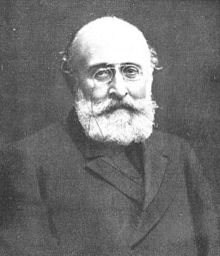
Back فرانثيسكو سيلبيلا Arabic فرانسيسكو سيلفيلا ARZ Francisco Silvela y de Le Vielleuze Catalan Francisco Silvela Le Vielleuze German Francisco Silvela Spanish Francisco Silvela Finnish Francisco Silvela French Francisco Silvela Galician Francisco Silvela le Vielleuze IO Francisco Silvela Italian
You can help expand this article with text translated from the corresponding article in Spanish. (March 2024) Click [show] for important translation instructions.
|
Francisco Silvela | |
|---|---|
 Photograph by Kaulak | |
| Prime Minister of Spain | |
| In office 6 December 1902 – 20 July 1903 | |
| Monarch | Alfonso XIII |
| Preceded by | Práxedes Sagasta |
| Succeeded by | Raimundo Fernández-Villaverde |
| In office 3 May 1899 – 22 October 1900 | |
| Monarch | Alfonso XIII |
| Preceded by | Práxedes Sagasta |
| Succeeded by | Marcelo Azcárraga |
| Seat K of the Real Academia Española | |
| In office 30 April 1893 – 29 May 1905 | |
| Preceded by | Mariano Roca de Togores |
| Succeeded by | Cristóbal Pérez Pastor[a] |
| Personal details | |
| Born | Francisco Silvela y Vielleuze 15 December 1843 Madrid, Spain |
| Died | 29 May 1905 (aged 61) Madrid, Spain |
| Signature | |
Francisco Silvela y Le Vielleuze (15 December 1843, in Madrid[1] – 29 May 1905, in Madrid[2]) was a Spanish politician who became Prime Minister of Spain on 3 May 1899, succeeding Práxedes Mateo Sagasta. He served in this capacity until 22 October 1900. Silvela also served a second term from 6 December 1902 to 20 July 1903, in which he succeeded another one of Práxedes Mateo Sagasta's many separate terms as prime minister.[3]
Francisco Silvela belonged to the Conservative Party led by Antonio Cánovas del Castillo.[4] He was a Deputy in Parliament continously from 1876 to 1903, mostly representing Ávila, but for one term he served Pontevedra.[5] He became leader of the Party after the assassination of Cánovas in 1897.[6][7] His government concluded the German–Spanish Treaty (1899), selling the remainder of the Spanish East Indies.[8]
Silvela named the general Arsenio Linares y Pombo, who had fought in the Spanish–American War, Minister of War in 1900. He withdrew from politics in 1903 and appointed Antonio Maura as his successor. He died in Madrid in 1905.
Silvela was elected to seat K of the Real Academia Española, he took up his seat on 30 April 1893.[8]
Cite error: There are <ref group=lower-alpha> tags or {{efn}} templates on this page, but the references will not show without a {{reflist|group=lower-alpha}} template or {{notelist}} template (see the help page).
- ^ Ruiz, Angel Salcedo y (1888). Francisco Silvela (in Spanish). F. Fê. p. 21. Retrieved 28 December 2024.
- ^ Almagro, Melchor Fernández (1977). Historia del reinado de Alfonso XIII (in Spanish). Montaner y Simon. p. 65. ISBN 978-84-274-0379-6. Retrieved 28 December 2024.
- ^ Balfour, Sebastian (1997). The End of the Spanish Empire, 1898-1923. Clarendon Press. pp. 57–61. ISBN 978-0-19-820507-4.
- ^ GOYANES, ENRIQUE SANCHEZ (31 December 1980). SISTEMA CONSTITUCIONAL ESPAÑOL (in Spanish). Ediciones Paraninfo, S.A. p. 138. ISBN 978-84-283-1062-8. Retrieved 28 December 2024.
- ^ "Buscador histórico - Congreso de los Diputados". www.congreso.es. Retrieved 28 December 2024.
- ^ Calvo, Juan A.; Prado, Carlos Gómez del (1972). La veta hispana: panorama de la civilización española (in Spanish). Appleton-Century-Crofts. p. 239. ISBN 978-0-390-16378-3. Retrieved 28 December 2024.
- ^ Jiménez-Landi, Antonio (1996). La Institución Libre de Enseñanza y su ambiente: Periodo escolar (1881-1907) (in Spanish). Edicions Universitat Barcelona. p. 335. ISBN 978-84-89365-98-8. Retrieved 28 December 2024.
- ^ a b "Francisco Silvela - letra K". Real Academia Española (in Spanish). Retrieved 27 May 2023.